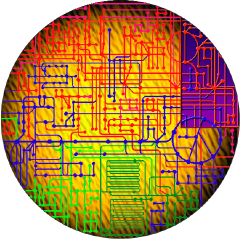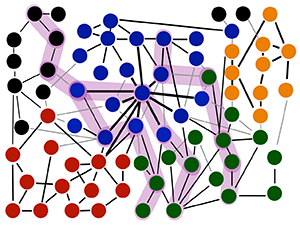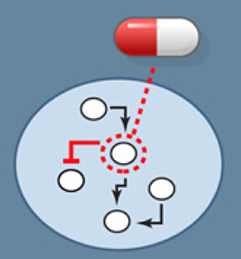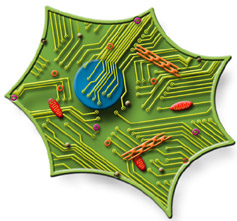Research

Currently, our most effective anti-cancer therapies are modulators of cell signaling pathways. For example, the DNA Damage Response (DDR) is modulated by radiation and traditional cytotoxic chemotherapies, while cell cycle, proliferation, and/or growth factor pathways are often perturbed by newer “targeted” therapies. These pathways are functionally integrated, very plastic, and incredibly sensitive to environmental context, making it difficult to predict how a cell will respond to a given drug treatment. Our group exists within an emerging discipline called Systems Pharmacology, which is broadly focused on understanding principles in drug therapy and the mechanisms underlying the therapeutic activity of drugs and complex drug combinations. Towards this end, our group uses a combination of experimental and computational approaches to study the organization and function of signaling networks controlling the growth, survival, and death of cancer cells. Our main focus has been on breast cancers, particularly those of the “triple-negative” variety, but we’ve become increasingly interested in determining the extent to which our findings from TNBCs can be applied to other types of cancer. Our main areas of interest fall in the following three areas:
Sources of Therapeutic Variability: Beyond the Genome!
It’s all about context…
 Decades of research have revealed cancer to be a remarkably complex disease, with profound heterogeneity existing between patients, between the tumors of a single patient, and even between the malignant cells within a single tumor. Furthermore, these cell autonomous sources of heterogeneity represent only one layer of complexity, as the tumor micro-environment can be highly variable and also plays an important role in the response to treatment. Responding to this complexity, many have rightly cited the need for more personalized therapies; however, it is still not clear what cellular, molecular, or tumor micro-environmental factors need to be considered for optimal patient stratification. Thus far, most of our attention has focused on cancer cell genomics; however, there is still great need to understand how other tumor specific aberrations are contributing to therapeutic response, including:
Decades of research have revealed cancer to be a remarkably complex disease, with profound heterogeneity existing between patients, between the tumors of a single patient, and even between the malignant cells within a single tumor. Furthermore, these cell autonomous sources of heterogeneity represent only one layer of complexity, as the tumor micro-environment can be highly variable and also plays an important role in the response to treatment. Responding to this complexity, many have rightly cited the need for more personalized therapies; however, it is still not clear what cellular, molecular, or tumor micro-environmental factors need to be considered for optimal patient stratification. Thus far, most of our attention has focused on cancer cell genomics; however, there is still great need to understand how other tumor specific aberrations are contributing to therapeutic response, including:
• Signaling Network Architecture
• Tumor Heterogeneity
• Tumor Micro-environment
• Signaling Dynamics (including the activity or post-translational modification state of various components)
Adaptation to aberrant signaling in the malignant environment can lead to radically different wiring in signaling networks controlling growth, survival, and death. Thus, predicting treatment efficacy will require greater detail about the atypical signaling state of cancer cells and how signaling dynamics are perturbed by cytotoxic chemotherapy and targeted drugs. We are particularly interested in understanding the adaptive properties that cells engage when faced with anti-cancer drugs, as well as identifying genetic, non-genetic, and contextual factors that contribute to the therapeutic variability seen in cancer patients.
Principles in Combination Drug Therapy
 One of the main goals of our research is to understand mechanisms of anti-cancer drug action, and to use this information to accelerate the creation of more effective therapeutic strategies. Currently, most effective cancer therapies involve the use of complex drug mixtures, rather than single targeted agents. Efficacious drug combinations are empirically identified through exhaustive screening, because we currently lack the ability to make a priori predictions of combinatorial drug effects. Furthermore, because systematically screening all relevant parameters is impractical, most efforts fail to address complex phenotypes that result from modulation of drug dose, duration, timing, and the order of drug presentation. We aim to study how cells respond to drugs, integrating genomic, proteomic, and dynamic response level data. By studying many drug combinations in many disease contexts, we hope to extend beyond the identification of effective or ineffective therapies, towards the identification of higher order rules that we can use to predict effective drug combinations. The driving principle for our work is that effective therapies can be found through understanding and modulating the state of signaling networks. To that end, we have focused on breast cancer, particularly those in the triple-negative breast cancer (TNBC) category, a poorly understood subtype for which effective therapies are lacking.
One of the main goals of our research is to understand mechanisms of anti-cancer drug action, and to use this information to accelerate the creation of more effective therapeutic strategies. Currently, most effective cancer therapies involve the use of complex drug mixtures, rather than single targeted agents. Efficacious drug combinations are empirically identified through exhaustive screening, because we currently lack the ability to make a priori predictions of combinatorial drug effects. Furthermore, because systematically screening all relevant parameters is impractical, most efforts fail to address complex phenotypes that result from modulation of drug dose, duration, timing, and the order of drug presentation. We aim to study how cells respond to drugs, integrating genomic, proteomic, and dynamic response level data. By studying many drug combinations in many disease contexts, we hope to extend beyond the identification of effective or ineffective therapies, towards the identification of higher order rules that we can use to predict effective drug combinations. The driving principle for our work is that effective therapies can be found through understanding and modulating the state of signaling networks. To that end, we have focused on breast cancer, particularly those in the triple-negative breast cancer (TNBC) category, a poorly understood subtype for which effective therapies are lacking.
Non-canonical Mechanisms of Cell Death

One of the fundamental hallmarks of cancer cells is their ability to evade apoptotic cell death. Many of the mutations and alterations found in cancer cells fundamentally change the regulation of signaling processes controlling growth, DNA damage signaling, and cell death. Furthermore, the precise alternations found in a particular cancer cell can be radically different from one type of cancer to the next, hampering our ability to devise effective therapeutic strategies. In our previous work, for example, we studied the DNA damage response (DDR) in triple-negative breast cancers (TNBCs) a particularly aggressive form of breast cancer. By measuring and modeling how these cells respond to various death cues, we found that many TNBC cells rely on oncogenic signaling through EGFR, a surprising finding considering that TNBCs do not typically have mutations or genetic alterations in EGFR itself. Nonetheless, through these studies, we gained insight into the atypical ways in which cell death is regulated in these cells, and devised therapeutic strategies that were specific to TNBCs (Lee et al. Cell 2012).
We are very interested in understanding the atypical ways cancer cells regulate cell death. Since cell death networks and other growth/survival networks are likely to be functionally integrated—collectively influencing the cellular response to a given stimulus—we focus broadly on the integration of a number of networks that modulate survival, including the DDR, cell cycle regulation, apoptotic and non-apoptotic cell death, and autophagy.